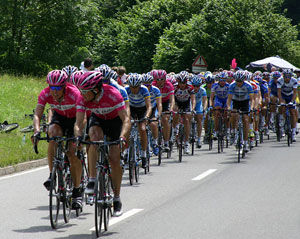
Source: TourDeFrance 2005 07 09, Vzach, Wikimedia
You may have heard people say, “That’s ironic, isn’t it?” when they notice a difference between what happens and what is expected to happen.
In “Chasing Armstrong with Truth,” New York Times columnist David Carr comments on the irony he saw in the discovery of evidence linking seven-time Tour de France winner Lance Armstrong to a cheating scandal in the world of competitive cycling. Based on Carr’s column, teacher Jessica Lahey wrote a question about irony for students. Read her question in the box below and choose the answer that best explains what Carr means by the word “ironic.”

Source: Lance Armstrong Tour de Gruene 2008-11-01, Daniel Norton, Wikimedia
Columnist David Carr tells the “story of how a group of people at the low end of bicycle racing used the Web and social media to take back custody of their sport from powerful dopers and liars and their enablers in the media.” When Carr writes that “it was ironic that NYVelocity, built by nonjournalists, did the hard work that much of the professional press did not,” what does he mean by the word “ironic”?
- That the media were too aggressive in their attempts to bring down Lance Armstrong
- That fans of cycling were too aggressive in their pursuit of Lance Armstrong
- That Lance Armstrong had paid off members of the press to keep his cheating a secret
- That Lance Armstrong had influenced the media and he should be guilty of more than cheating in professional cycling
- That the media, not laypeople, should have been the ones to investigate and reveal the truth about Lance Armstrong’s cheating
If you chose e, you’re doing a great job of detecting irony. Ms. Lahey explains that “journalists, professional investigative writers dedicated to finding the truth, rather than laypeople should have revealed the scope of Armstrong’s cheating.” One would have expected journalists to bring the evidence of cheating to light. Instead, nonjournalists did so, making the situation ironic.
Let’s see if you can identify the irony in two additional situations. Read the excerpts below and identify how what actually happened is different than what was expected.

Before we end this section, watch the video below. It will help you further understand how expectations shape irony.
Source: Situational irony: The opposite of what you think - Christopher Warner, TEDEducation, You Tube